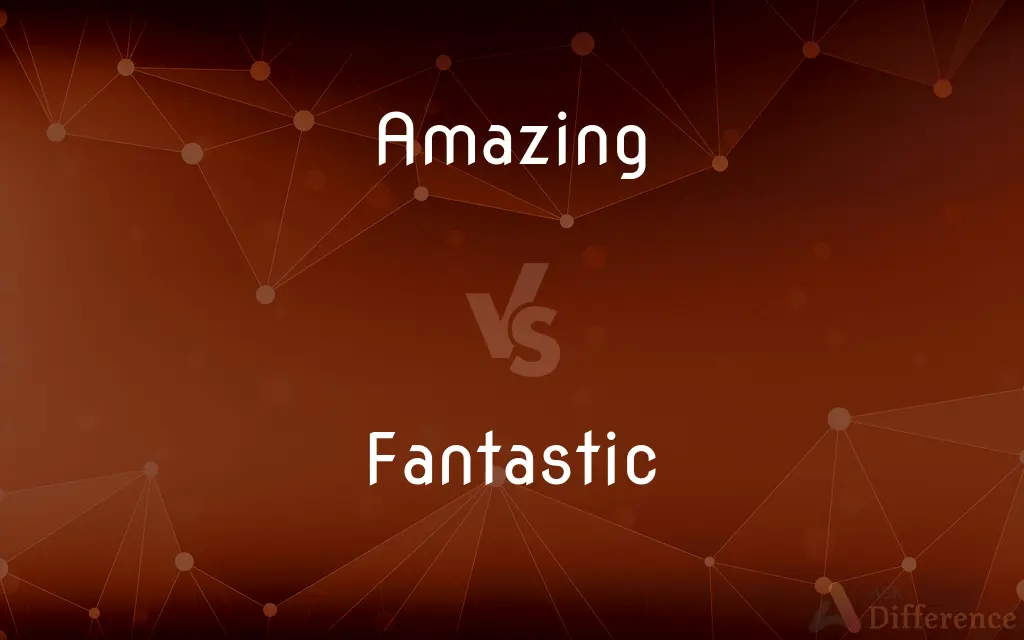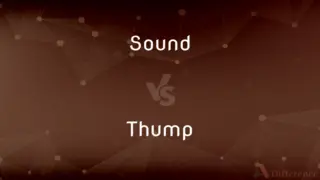Amazing vs. Fantastic — What's the Difference?
By Fiza Rafique & Maham Liaqat — Updated on April 24, 2024
Amazing describes something that causes great surprise or wonder, whereas fantastic refers to something incredibly good or implausible.

Difference Between Amazing and Fantastic
Table of Contents
ADVERTISEMENT
Key Differences
The term "amazing" is often used to describe something that is surprising and evokes a sense of wonder or awe. On the other hand, "fantastic" is typically used to denote something that is extraordinarily good or exceeds normal expectations. Both terms are frequently used in positive contexts but convey slightly different emotional intensities.
"Amazing" can apply to a broader range of scenarios, from simple unexpected pleasures to grandiose discoveries. Whereas "fantastic" often carries a connotation of grandeur and may imply a level of unreality or fantasy, especially when describing fictional or highly idealized scenarios.
In everyday language, "amazing" might be used to describe genuinely impactful experiences, suggesting a transformation or significant effect on the observer. On the other hand, "fantastic" can be used more casually, often to express enthusiasm or approval without the depth of transformation implied by "amazing".
When describing personal achievements or skills, "amazing" often implies a high level of proficiency or an unexpected outcome. Conversely, "fantastic" might be used more hyperbolically, emphasizing the exceptional nature of an achievement rather than its surprise element.
In literary contexts, "amazing" can describe a plot twist or character development that is particularly ingenious or unexpected. Meanwhile, "fantastic" is often reserved for elements involving fantasy or imaginative stretching of the bounds of reality.
ADVERTISEMENT
Comparison Chart
Connotation
Evokes surprise and wonder
Implies something exceptionally good
Usage in Language
Broader, can be realistic or impressive
Often hyperbolic, tied to fantasy
Emotional Intensity
Strong, transformative
High, but can be less impactful
Common Contexts
Achievements, discoveries
Praise, enthusiasm, fictional settings
Implication
Unexpected, transformative effect
Exceeds expectations, may be unreal
Compare with Definitions
Amazing
Inspiring great surprise or wonder.
The view from the mountain was simply amazing.
Fantastic
Extremely good or attractive.
Your idea for the project is absolutely fantastic.
Amazing
Extremely surprising.
It's amazing how quickly the children adapted.
Fantastic
Enthusiastically positive.
His response was fantastically supportive.
Amazing
Causing astonishment or disbelief.
Her amazing performance won her the competition.
Fantastic
Very large or extreme.
They won by a fantastic margin.
Amazing
Exceptionally good or impressive.
They did an amazing job decorating the hall.
Fantastic
Imaginatively conceived or fantastical.
The artist's latest work is a fantastic landscape of otherworldly beauty.
Amazing
Unbelievably effective or efficient.
The new software is amazing at speeding up data processing.
Fantastic
Unrealistically exaggerated.
The movie's plot was fantastic but entertaining.
Amazing
To affect with great wonder; astonish.
Fantastic
The fantastic (French: le fantastique) is a subgenre of literary works characterized by the ambiguous presentation of seemingly supernatural forces. Bulgarian-French structuralist literary critic Tzvetan Todorov originated the concept, characterizing the fantastic as the hesitation of characters and readers when presented with questions about reality.
Amazing
(Obsolete) To bewilder; perplex.
Fantastic
Based on or existing only in fantasy; unreal
Fantastic mythological creatures.
The fantastic realms of science fiction.
Amazing
To cause great wonder or astonishment
A sight that amazes.
Fantastic
Strange or fanciful in form, conception, or appearance
“The fire assumed fantastic shapes as he watched” (Ward Just).
Amazing
Amazement; wonder.
Fantastic
Unrealistic; irrational
“the early jubilant years of the Restoration with their fantastic hopes of a Golden Age and incorruptible power” (Janet Todd).
Amazing
Present participle of amaze
Fantastic
Exceedingly great in size or degree; extravagant
A fantastic sum of money.
Amazing
Causing wonder and amazement; very surprising.
Fantastic
Wonderful or superb; remarkable
A fantastic trip to Europe.
Amazing
(informal) Possessing uniquely wonderful qualities; very good.
Fantastic
An eccentric person.
Amazing
Causing amazement; very wonderful; as, amazing grace.
Fantastic
Existing in or constructed from fantasy; of or relating to fantasy; fanciful.
He told fantastic stories of dragons and goblins.
His fantastic post-college plans had all collapsed within a year of graduation.
She had a fantastic view of her own importance that none of her colleagues shared.
Amazing
Surprising greatly;
She does an amazing amount of work
The dog was capable of astonishing tricks
Fantastic
Not believable; implausible; seemingly only possible in fantasy.
The events were so fantastic that only the tabloids were willing to print them.
She entered the lab and stood gaping for a good ten minutes at the fantastic machinery at work all around her.
Amazing
Inspiring awe or admiration or wonder;
New York is an amazing city
The Grand Canyon is an awe-inspiring sight
The awesome complexity of the universe
This sea, whose gently awful stirrings seem to speak of some hidden soul beneath
Westminster Hall's awing majesty, so vast, so high, so silent
Fantastic
Resembling fantasies in irregularity, caprice, or eccentricity; irregular; grotesque.
Fantastic
Wonderful; marvelous; excellent; extraordinarily good or great (used especially as an intensifier).
"I had a simply fantastic vacation, and I can't wait to tell you all about it!"
Fantastic
(archaic) A fanciful or whimsical person.
Fantastic
Existing only in imagination; fanciful; imaginary; not real; chimerical.
Fantastic
Having the nature of a phantom; unreal.
Fantastic
Indulging the vagaries of imagination; whimsical; full of absurd fancies; capricious; as, fantastic minds; a fantastic mistress.
Fantastic
Resembling fantasies in irregularity, caprice, or eccentricity; irregular; oddly shaped; grotesque.
There at the foot of yonder nodding beech,That wreathes its old fantastic roots so high.
Fantastic
A person given to fantastic dress, manners, etc.; an eccentric person; a fop.
Our fantastics, who, having a fine watch, take all ocasions to draw it out to be seen.
Fantastic
Ludicrously odd;
Hamlet's assumed antic disposition
Fantastic Halloween costumes
A grotesque reflection in the mirror
Fantastic
Extraordinarily good; used especially as intensifiers;
A fantastic trip to the Orient
The film was fantastic!
A howling success
A marvelous collection of rare books
Had a rattling conversation about politics
A tremendous achievement
Fantastic
Extravagantly fanciful and unrealistic; foolish;
A fantastic idea of his own importance
Fantastic
Existing in fancy only;
Fantastic figures with bulbous heads the circumference of a bushel
Fantastic
Exceedingly or unbelievably great;
The bomb did fantastic damage
Samson is supposed to have had fantastic strength
Phenomenal feats of memory
Common Curiosities
What contexts are appropriate for using "amazing"?
"Amazing" is suitable for describing things that are genuinely surprising or impressively transformative.
How do the implications of "amazing" and "fantastic" differ in a professional setting?
In professional settings, "amazing" might refer to exceptional skills or achievements, while "fantastic" could be seen as giving enthusiastic approval or feedback.
Is "fantastic" always related to fantasy?
No, "fantastic" can be used to describe things that are incredibly good or pleasing, not just fantasy-related.
What are some synonyms for "amazing" and "fantastic"?
For "amazing": astonishing, astounding, marvelous. For "fantastic": incredible, wonderful, fabulous.
Can "fantastic" be used in a negative connotation?
While primarily positive, "fantastic" can sometimes be used sarcastically to mean something is unbelievably bad or far-fetched.
What impact do these words have in storytelling?
In storytelling, "amazing" can help to convey the impact of plot developments or character arcs, while "fantastic" might be used to enhance the enchanting or extraordinary elements of a narrative.
Can "amazing" and "fantastic" be used interchangeably?
While often used interchangeably in casual speech, "amazing" implies wonder due to surprise, and "fantastic" conveys greatness or implausibility.
Is one term more modern than the other?
Both terms are modern and widely used today, though "fantastic" may carry slightly older literary connotations due to its roots in the fantasy genre.
What is a common misuse of the word "fantastic"?
Using "fantastic" to describe mundane or unremarkable things can dilute its impact as a descriptor for truly exceptional or imaginative scenarios.
How does the intensity of "amazing" compare to "fantastic"?
"Amazing" typically suggests a more profound emotional impact or surprise, while "fantastic" may convey intense approval but with a slightly lighter or more casual tone.
Which term is more likely to be used in scientific contexts?
"Amazing" is more likely to be used in scientific contexts to describe remarkable discoveries or results, whereas "fantastic" might be seen as less formal or scientific.
How do "amazing" and "fantastic" function in promotional materials?
In promotional materials, "amazing" is often used to highlight the unique or surprising features of a product, while "fantastic" might be used to create a strong, positive impression about the product's quality or appeal.
How do the terms vary in emotional depth?
"Amazing" often carries deeper emotional resonance, implying something impactful or profound, whereas "fantastic" might be used for more superficial, though very positive, reactions.
How do "amazing" and "fantastic" compare when describing a performance?
"Amazing" might focus more on the surprising elements or exceptional skill in a performance, while "fantastic" could be used to describe an overall exhilarating experience.
Which term would be more appropriate for describing a technological innovation?
"Amazing" would typically be more appropriate for describing technological innovations, especially if they represent a significant leap forward or surprising development.
Share Your Discovery

Previous Comparison
Jewellery vs. Accessory
Next Comparison
Sound vs. ThumpAuthor Spotlight
Written by
Fiza RafiqueFiza Rafique is a skilled content writer at AskDifference.com, where she meticulously refines and enhances written pieces. Drawing from her vast editorial expertise, Fiza ensures clarity, accuracy, and precision in every article. Passionate about language, she continually seeks to elevate the quality of content for readers worldwide.
Co-written by
Maham Liaqat















































